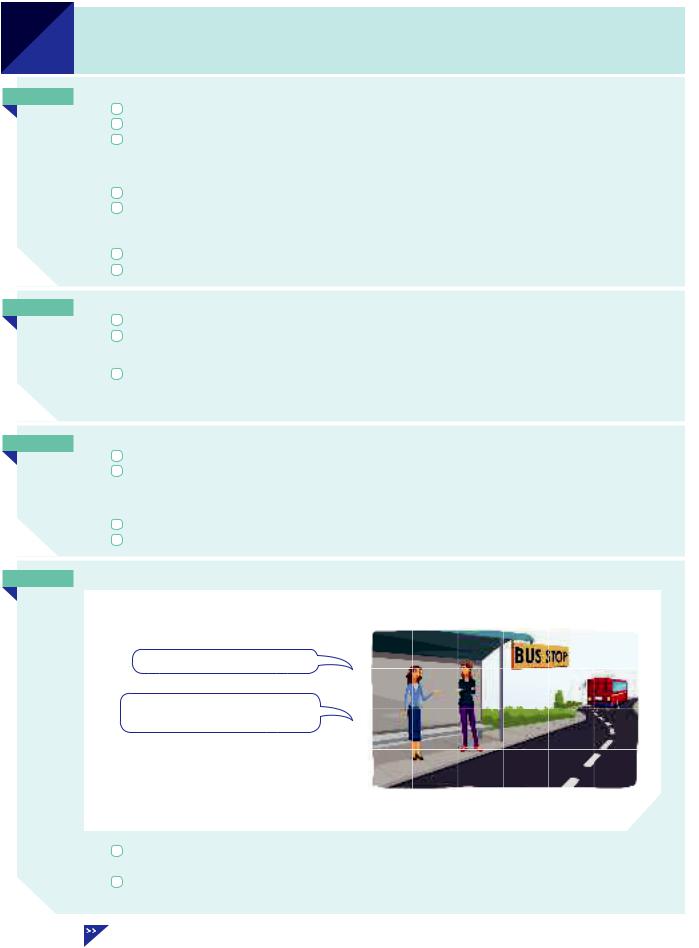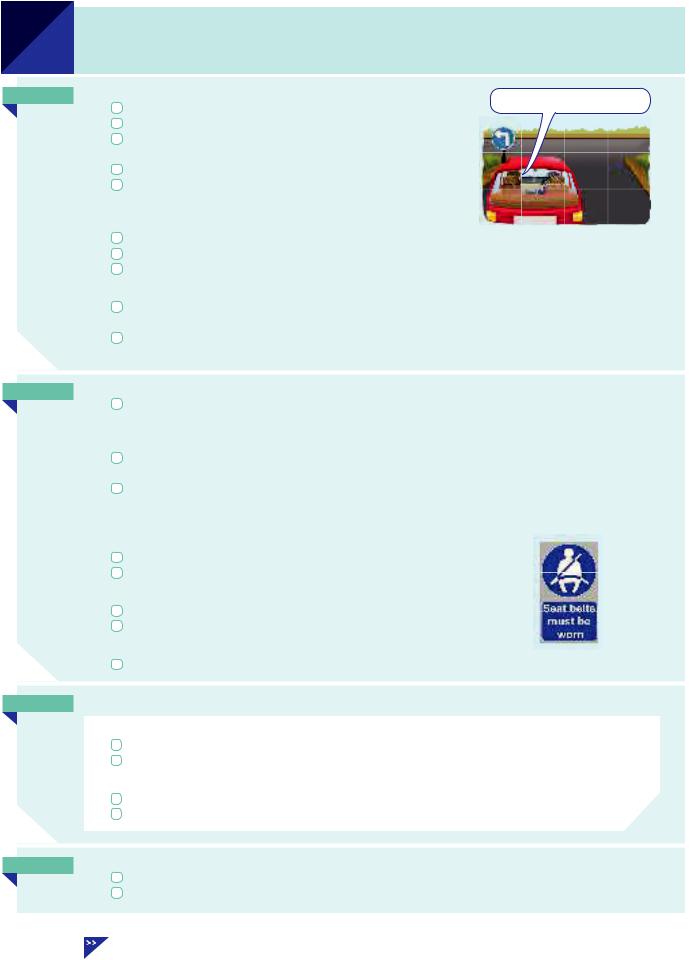
- •Contents
- •Thanks
- •To the student
- •To the teacher
- •3 Present continuous and present simple 1 (I am doing and I do)
- •10 Present perfect continuous and simple (I have been doing and I have done)
- •11 how long have you (been) … ?
- •12 for and since when … ? and how long … ?
- •13 Present perfect and past 1 (I have done and I did)
- •14 Present perfect and past 2 (I have done and I did)
- •15 Past perfect (I had done)
- •16 Past perfect continuous (I had been doing)
- •17 have and have got
- •18 used to (do)
- •19 Present tenses (I am doing / I do) for the future
- •20 I’m going to (do)
- •21 will and shall 1
- •22 will and shall 2
- •23 I will and I’m going to
- •24 will be doing and will have done
- •26 can, could and (be) able to
- •27 could (do) and could have (done)
- •28 must and can’t
- •29 may and might 1
- •30 may and might 2
- •31 have to and must
- •32 must mustn’t needn’t
- •33 should 1
- •34 should 2
- •35 I’d better … it’s time …
- •36 would
- •39 if I knew … I wish I knew …
- •40 if I had known … I wish I had known …
- •41 wish
- •42 Passive 1 (is done / was done)
- •43 Passive 2 (be done / been done / being done)
- •44 Passive 3
- •45 it is said that … he is said to … he is supposed to …
- •46 have something done
- •47 Reported speech 1 (he said that …)
- •48 Reported speech 2
- •49 Questions 1
- •52 Question tags (do you? isn’t it? etc.)
- •53 Verb + -ing (enjoy doing / stop doing etc.)
- •54 Verb + to … (decide to … / forget to … etc.)
- •55 Verb (+ object) + to … (I want you to …)
- •56 Verb + -ing or to … 1 (remember, regret etc.)
- •57 Verb + -ing or to … 2 (try, need, help)
- •58 Verb + -ing or to … 3 (like / would like etc.)
- •59 prefer and would rather
- •60 Preposition (in/for/about etc.) + -ing
- •61 be/get used to … (I’m used to …)
- •63 there’s no point in -ing, it’s worth -ing etc.
- •64 to … , for … and so that …
- •65 Adjective + to …
- •66 to … (afraid to do) and preposition + -ing (afraid of -ing)
- •67 see somebody do and see somebody doing
- •68 -ing clauses (He hurt his knee playing football.)
- •69 Countable and uncountable 1
- •70 Countable and uncountable 2
- •71 Countable nouns with a/an and some
- •74 the 2 (school / the school etc.)
- •75 the 3 (children / the children)
- •77 Names with and without the 1
- •78 Names with and without the 2
- •79 Singular and plural
- •80 Noun + noun (a bus driver / a headache)
- •81 -’s (your sister’s name) and of … (the name of the book)
- •82 myself/yourself/themselves etc.
- •83 a friend of mine my own house on my own / by myself
- •84 there … and it …
- •85 some and any
- •87 much, many, little, few, a lot, plenty
- •90 all every whole
- •91 each and every
- •92 Relative clauses 1: clauses with who/that/which
- •94 Relative clauses 3: whose/whom/where
- •95 Relative clauses 4: extra information clauses (1)
- •96 Relative clauses 5: extra information clauses (2)
- •97 -ing and -ed clauses (the woman talking to Tom, the boy injured in the accident)
- •98 Adjectives ending in -ing and -ed (boring/bored etc.)
- •99 Adjectives: a nice new house, you look tired
- •100 Adjectives and adverbs 1 (quick/quickly)
- •102 so and such
- •104 quite, pretty, rather and fairly
- •105 Comparative 1 (cheaper, more expensive etc.)
- •106 Comparative 2 (much better / any better etc.)
- •107 Comparative 3 (as … as / than)
- •108 Superlative (the longest / the most enjoyable etc.)
- •109 Word order 1: verb + object; place and time
- •110 Word order 2: adverbs with the verb
- •111 still any more yet already
- •112 even
- •114 in case
- •116 as (as I walked … / as I was … etc.)
- •117 like and as
- •119 during for while
- •121 at/on/in (time)
- •122 on time and in time at the end and in the end
- •123 in/at/on (position) 1
- •124 in/at/on (position) 2
- •125 in/at/on (position) 3
- •126 to, at, in and into
- •127 in/on/at (other uses)
- •129 Noun + preposition (reason for, cause of etc.)
- •130 Adjective + preposition 1
- •131 Adjective + preposition 2
- •132 Verb + preposition 1 to and at
- •134 Verb + preposition 3 about and of
- •135 Verb + preposition 4 of/for/from/on
- •136 Verb + preposition 5 in/into/with/to/on
- •137 Phrasal verbs 1 Introduction
- •138 Phrasal verbs 2 in/out
- •139 Phrasal verbs 3 out
- •142 Phrasal verbs 6 up/down
- •143 Phrasal verbs 7 up (1)
- •144 Phrasal verbs 8 up (2)
- •145 Phrasal verbs 9 away/back
- •Additional exercises
- •Study guide
- •Key to Exercises
- •Key to Additional exercises (see page 302)
- •Key to Study guide
- •Index

Unit
30 may and might 2
AWe use may and might to talk about possible actions or happenings in the future:
I haven’t decided where to go on holiday. I may go to Ireland. (= perhaps I will go there) Take an umbrella with you. It might rain later. (= perhaps it will rain)
The bus isn’t always on time. We might have to wait a few minutes. (= perhaps we will have to wait)
The negative forms are may not and might not (mightn’t):
Amy may not go out tonight. She isn’t feeling well. (= perhaps she will not go out)
There might not be enough time to discuss everything at the meeting. (= perhaps there will not be enough time)
Compare:
I’m going to buy a car. (for sure)
I may buy a car. or I might buy a car. (possible)
BUsually you can use may or might. So you can say:
I may go to Ireland. or I might go to Ireland.
Jane might be able to help you. or Jane may be able to help you.
But we use might (not may) when the situation is not real:
If they paid me better, I might work harder. (not I may work)
This situation (If they paid me better) is not real. They do not pay me well, so I’m not going to work harder.
CCompare may/might be -ing and will be -ing:
Don’t phone at 8.30. I’ll be watching the football on TV.
Don’t phone at 8.30. I might be watching the football on TV. (= perhaps I’ll be watching it)
We also use may/might be -ing for possible plans. Compare:
I’m going to Ireland soon. (for sure)
I might be going (or I may be going) to Ireland soon. (possible)
Dmight as well
Helen and Clare have just missed the bus.
The buses run every hour.
What shall we do? Shall we walk?
We might as well. It’s a nice day and
I don’t want to wait here for an hour.
We might as well do something = we should do it because there is no better alternative. There is no reason not to do it.
You can also use may as well.
a: What time are you going out?
b: Well, I’m ready, so I might as well go now. or … I may as well go now. Buses are so expensive these days, you might as well get a taxi.
(= taxis are as good, no more expensive than buses)
|
will be -ing Unit 24 may/might 1 Unit 29 may I … ? Unit 37 |
60 |
might with if Units 38C, 40D |

Exercises |
Unit |
30 |
|
|
|
30.1Which alternative makes sense?
1 a: Where are you going for your holidays?
b:I haven’t decided yet. I might go / I’m going to Ireland. (I might go makes sense) 2 a: Have you decided what sort of car you want to buy?
b:Yes, I might get / I’m going to get a sports car. 3 a: When is Tom coming to see us?
b:He hasn’t said yet. He might come / He’s coming on Sunday. 4 a: Where are you going to put that picture?
b:I don’t know yet. I might hang / I’m going to hang it in the bedroom.
5 a: What’s Tanya going to do when she leaves school? Does she know yet?
b:Yes, she’s decided. She might go / She’s going to university. 6 a: Do you have plans for the weekend?
b:Nothing fixed. I might go away / I’m going away.
30.2Complete the sentences using might + a verb from the box:
1 |
Take an umbrella with you when you go out. It might rain |
later. |
2 |
Don’t make too much noise. You |
the baby. |
3 |
Be careful with your cofee. You |
it. |
4 |
Don’t forget your phone. You |
it. |
5 |
It’s better if we don’t talk so loud. Somebody |
us. |
6 |
Be careful. This footpath is icy. You |
. |
30.3 Complete the sentences. Use might be able to or might have to + one of these verbs:
hear need rain slip spill wake
|
fix |
help |
leave |
meet |
pay |
wait |
|
1 |
Tell me about your problem. I might be |
able to help |
you. |
||||
2 |
I can come to the meeting, but I |
|
|
before the end. |
|||
3 |
I’m not free this evening, but I |
|
|
you tomorrow evening. |
|||
4 |
I’m not sure whether this car park is free or not. We |
. |
|||||
5 |
There’s a long queue. We |
|
|
|
a long time. |
||
6 |
‘I’ve got a problem with my bike.’ |
‘Let me have a look. I |
it.’ |
||||
30.4 Write sentences with might not.
1 Lisa’s not feeling very well. I’m not sure that she will go to the party.
Lisa might not come to the party.
2 |
I haven’t seen him for a long time. I don’t know if I will recognise him or not. |
|||
|
|
I might |
him. |
|
3 |
We want to go to the game, but I don’t know whether we’ll be able to get tickets. |
|||
|
|
We |
|
for the game. |
4 |
I said I’d do the shopping, but it’s possible I won’t have time. |
|||
|
|
I |
|
to do the shopping. |
5 |
I’ve been invited to the wedding, but I’m not sure that I’ll be able to go. |
|||
|
|
I |
|
. |
|
||||
30.5 |
Read the situations and write sentences with might as well. |
|||
1 |
You and a friend have just missed the bus. The buses run every hour. |
|||
|
|
You say: We’ll have to wait an hour for the next bus. |
We might as well walk . |
|
2 |
Your computer doesn’t work any more. It will cost a lot to repair. |
|||
|
|
You say: It’s not worth repairing. I |
|
a new one. |
3 |
You’ve painted the kitchen. You still have a lot of paint, so why not paint the bathroom too? |
|||
|
|
You say: I |
|
too. There’s plenty of paint let. |
4 |
You and a friend are at home. You’re bored. There’s a film on TV starting in a few minutes. |
|||
|
|
You say: We |
|
it. There’s nothing else to do. |
Additional exercises 16–18 (pages 311–13) |
61 |

Unit
31 have to and must
AI have to do something = it is necessary to do it, I am obliged to do it:
You can’t turn right here. You have to turn let . I have to wear glasses for reading.
Robert can’t come out with us this evening. He has to work late.
Last week Tina broke her arm and had to go to hospital. I haven’t had to go to the doctor for ages.
You have to turn let here.
We use do/does/did in questions and negative sentences (for the present and past simple):
What do I have to do to get a new driving licence? (not What have I to do?)
Karen doesn’t have to work Saturdays. (not Karen hasn’t to)
‘Did you have to wait a long time for a bus?’ ‘No, only ten minutes.’
You can say I’ll have to … , I’m going to have to … , I might have to … , I may have to … :
They can’t repair my computer, so I’ll have to buy a new one. or
… I’m going to have to buy a new one.
We might have to change our plans. or We may have to change …
(= it’s possible that we will have to change them)
BMust is similar to have to. You can say:
It’s later than I thought. I must go. or I have to go.
You can use must or have to when you give your own opinion (for example, to say what you think is necessary, or to recommend someone to do something):
I haven’t spoken to Sue for ages. I must phone her. / I have to phone her. (= I say this is necessary)
Mark is a really nice person. You must meet him. / You have to meet him. (= I recommend this)
We use have to (not usually must) to say what someone is obliged to do. This is a fact, not the speaker’s own opinion:
I have to work from 8.30 to 5.30 every day. (a fact, not an opinion) Jane has to travel a lot for her work.
But we use must in written rules and instructions:
Applications for the job must be received by 18 May.
Seat belts must be worn.
We use had to (not must) to talk about the past:
I went to the meeting yesterday, but I had to leave early. (not I must)
CMustn’t and don’t have to are completely diferent:
You mustn’t do something = don’t do it:
You must keep this a secret. You mustn’t tell anyone. (= don’t tell anyone) I promised I would be on time. I mustn’t be late. (= I must be on time)
You don’t have to do something = you don’t need to do it (but you can if you want):
You don’t have to come with me. I can go alone.
I don’t have to be at the meeting, but I’m going anyway.
DYou can use have got to instead of have to. You can say:
I’ve got to work tomorrow. |
or |
I have to work tomorrow. |
When has Helen got to go? |
or |
When does Helen have to go? |
62 |
must (‘You must be tired’) Unit 28 must/mustn’t/needn’t Unit 32 |

Exercises |
Unit |
31 |
|
|
|
31.1 Complete the sentences using have/has/had to … . Use the verbs in brackets.
1 |
Robert can’t come out with us this evening. |
He has to work |
late. (he / work) |
2 |
‘The bus was late this morning.’ ‘How long |
did you have to wait ?’ (you / wait) |
|
3 |
I don’t have much time. |
|
in ten minutes. (I / go) |
4 |
‘I’m afraid I can’t stay long.’ ‘What time |
|
?’ (you / go) |
5 |
Joe starts work at 5 am every day, which means |
at four. (he / get up) |
|
6 |
We nearly missed the bus this morning. |
|
to catch it. (we / run) |
7 |
Is Lisa usually free on Saturdays or |
|
? (she / work) |
8 |
There was nobody to help me. |
|
everything by myself. (I / do) |
9 |
How old |
|
to have a driving licence? (you / be) |
10 |
There was a lot of noise from the street. |
|
the window. (we / close) |
11 |
Was the exhibition free, or |
|
to go in? (you / pay) |
31.2Complete the sentences using have/has/had to + the verbs in the list. Some sentences are negative
(I don’t have to … etc.):
|
ask |
decide |
drive |
get up |
go |
make |
make |
pay |
show |
stand |
1 |
I’m not working tomorrow, so |
I don’t have to get up |
early. |
|
|
|
||||
2 |
Steve didn’t know how to change the settings on his phone. I had to show |
him. |
|
|||||||
3 |
Excuse me a moment – I |
|
|
|
|
a phone call. I won’t be long. |
||||
4 |
You can let me know later what you want to do. You |
|
|
|
now. |
|||||
5 |
I couldn’t find the street I wanted. I |
|
|
|
|
somebody for directions. |
||||
6 |
This car park is free. You |
|
|
|
|
|
|
. |
||
7 |
A man was slightly injured in the accident, but he |
|
|
|
|
to hospital. |
||||
8 |
Jane has a senior position in the company. She |
|
|
|
important decisions. |
|||||
9 |
The train was very full and there were no seats free. We |
|
|
|
all the way. |
|||||
10 |
When Patrick starts his new job next month, he |
|
|
|
|
50 miles to work |
||||
|
every day. |
|
|
|
|
|
|
|
|
|
31.3 In some of these sentences, must is wrong or unnatural. Correct the sentences where necessary.
1 It’s later than I thought. I must go.
2 I must start work every day at 8.30.
3 I must remember to call Sarah tomorrow.
4 I couldn’t get a taxi last night. I must walk home. 5 You must come and see us again soon.
6Tom isn’t going out this evening. He must study for his exam.
7We can’t go the usual way because the road is closed. We must go another way.
8Julia wears glasses. She must wear glasses since she was very young.
OK (I have to go is also correct)
I have to start work
31.4 Complete the sentences with mustn’t, don’t have to or doesn’t have to.
1 |
I don’t want anyone to know about our plan. You mustn’t |
tell anyone. |
|
2 |
Richard doesn’t have to |
wear a suit to work, but he usually does. |
|
3 |
There’s a lit in the building, so we |
climb the stairs. |
|
4 |
I promised Kate I’d call her tomorrow. I |
forget. |
|
5 |
I’m not very busy. I have a few things to do, but I |
do them now. |
|
6 |
Sophie likes weekends because she |
get up early. |
|
7 |
You |
be a good player to enjoy a game of tennis. |
|
8 |
You should keep trying to find a job. You |
give up. |
|
9 |
I |
eat too much. I’m supposed to be on a diet. |
|
10 |
We have plenty of time before our flight. We |
check in yet. |
|
Additional exercise 16 (page 311) |
63 |
